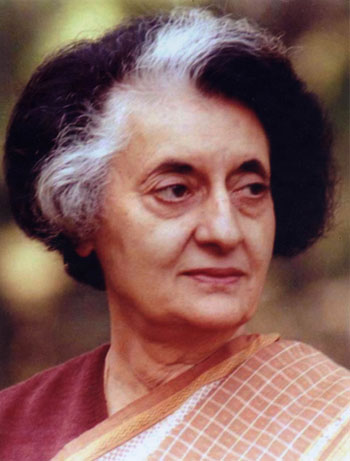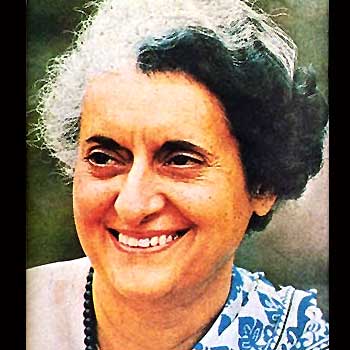

Indira Gandhi was born in an aristocratic family of Nehru on 19 November, 1917, in Allahabad. Her father, Jawaharlal Nehru was a lawyer and also leader of the Indian Nationalist Movement. Indira's mother, Kamala, was a religious lady. It was reported that there was a huge difference between the lifestyle of Jawaharlal Nehru and his wife Kamala. The Nehrus, for traditions, followed a more-western and sophisticated lifestyle. This is one of the reasons her mother had nearly-isolated herself from the values of the Nehrus.

Indira’s Grandfather, Motilal Nehru was a renowned barrister of that period. He was also a prominent member of the Indian National Congress Party. Due to this, lot of noted leaders and party activists would visit the “Nehru House”. Mahatma Gandhi was one of them. Therefore, since childhood, Indira Gandhi had developed an interest in the affairs of country’s politics. Indira Gandhi attended prominent schools including Shantiniketan, Badminton School and Oxford, but she showed no great aptitude for academics, and was detained from obtaining a degree. In 1936, her mother, Kamala Nehru, finally succumbed to tuberculosis after a long struggle. She was eighteen at the time. Jawaharlal Nehru was languishing in the Indian jails that time.

In 1942, she got married to Feroze Gandhi. Two sons were born to her- Rajiv Gandhi and Sanjay Gandhi. Indira Gandhi became the third Prime Minister of India on January 24, 1966 and remained in this post up to 1977. In 1975, her election to Parliament was declared invalid and she declared internal emergency, which led to her defeat in 1977 elections. Indira Gandhi returned to power in 1980 with an overwhelming majority.
She was one of the most efficient Prime Ministers of India and is credited with great achievements. Noteworthy among them are nationalization of banks, liberation of Bangladesh and 20 point programme for the upliftment of the poor. She was honoured with 'Bharat Ratna' in 1971.

Gandhi faced major problems in the areas of food production, population control, land reform, regulation of prices, unemployment, and industrial production. The problems were increased by the arrival in India of almost ten million refugees, who were uprooted as a result of the civil unrest in East Pakistan. In November 1971 Indian troops crossed into East Pakistan to fight Pakistani forces. A month later Gandhi announced recognition of the Bangladesh government set up by East Pakistani rebel leaders. On December 16 Pakistan's commander in East Pakistan surrendered to India.
In the state elections held in India in March 1972, Gandhi's New Congress Party scored the most overwhelming victory in the history of independent India. However, her opponent accused her of violating election laws, and a high court supported the charge in 1975. Because of this development, as well as domestic unrest, Gandhi declared a state of emergency and postponed elections. In the 1977 elections Gandhi and her party suffered major defeats and Gandhi eventually lost her seat and the post of prime minister.
The following year Gandhi headed the Congress Party as she returned to Parliament. In 1979 she again became prime minister. In efforts to prove India's nonalliance in the global community, she visited both the United States and the U.S.S.R., the former Soviet Union, which consisted of Russia and several smaller states. Internally, riots broke out among Muslim, Hindu, and Sikh religious sects, or groups. Sikhs, looking to separate themselves from India, secured weapons within their sacred Golden Temple in Amritsar, and assumed religious protection. Gandhi ordered government troops to storm the temple, leading to many Sikh deaths. This led to her assassination at her residence on October 31, 1984, by her own Sikh security guards. In death, Gandhi remains a symbol of courage and democracy in one of the world's most populated countries.


In the state elections held in India in March 1972, Gandhi's New Congress Party scored the most overwhelming victory in the history of independent India. However, her opponent accused her of violating election laws, and a high court supported the charge in 1975. Because of this development, as well as domestic unrest, Gandhi declared a state of emergency and postponed elections. In the 1977 elections Gandhi and her party suffered major defeats and Gandhi eventually lost her seat and the post of prime minister.
The following year Gandhi headed the Congress Party as she returned to Parliament. In 1979 she again became prime minister. In efforts to prove India's nonalliance in the global community, she visited both the United States and the U.S.S.R., the former Soviet Union, which consisted of Russia and several smaller states. Internally, riots broke out among Muslim, Hindu, and Sikh religious sects, or groups. Sikhs, looking to separate themselves from India, secured weapons within their sacred Golden Temple in Amritsar, and assumed religious protection. Gandhi ordered government troops to storm the temple, leading to many Sikh deaths. This led to her assassination at her residence on October 31, 1984, by her own Sikh security guards. In death, Gandhi remains a symbol of courage and democracy in one of the world's most populated countries.



No comments:
Post a Comment